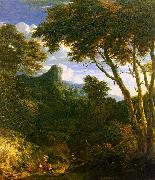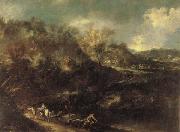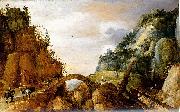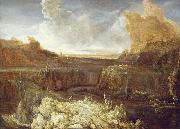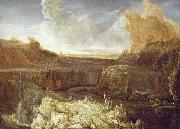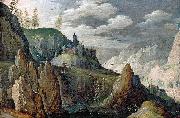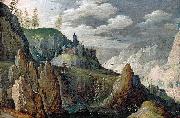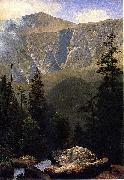Wholesale Oil Painting No Minimum |
|||||||||||
|
|
|||||||||||

|
|||||||||||
|
|
|
||||||||
Jean-Baptiste HuysmansFlemish 1654-1716 |
||||||||
|
|
||||||||
Mountainous Landscape
Mountainous Landscape Painting ID:: 2232 |
|
|||||||
|
|
||||||||
MAGNASCO, AlessandroItalian Rococo Era Painter, 1667-1749 Painter and draughtsman, son of (1) Stefano Magnasco. He did not study with his father, who died when he was a small child. He went to Milan, probably between 1681 and 1682, and entered the workshop of Filippo Abbiati (1640-1715). His Christ Carrying the Cross (Vitali, priv. col., see Franchini Guelfi, 1987, fig. 238) faithfully repeats the subject and composition of Abbiati's painting of the same subject (Pavia, Pin. Malaspina). Alessandro Magnasco's early works were influenced by the harsh and dramatic art of 17th-century Lombardy, with dramatic contrasts of light and dark and livid, earthy tones, far removed from the bright, glowing colours of contemporary Genoese painting. The depiction of extreme emotion in the St Francis in Ecstasy (Genoa, Gal. Pal. Bianco) was inspired by Francesco Cairo's Dream of Elijah (Milan, S Antonio Abate). However, Magnasco was already expressing himself in a very personal manner, with forms fragmented by swift brushstrokes and darting flashes of light. The Quaker Meeting (1695; ex-Vigan? priv. col., see Franchini Guelfi, 1991, no. 18) is one of his first genre scenes. In this early period he specialized as a figurista, creating small human figures to be inserted in the landscapes and architectural settings of other painters. He also began collaborating with the landscape painter Antonio Francesco Peruzzini, with a specialist in perspective effects, |
||||||||
|
|
||||||||
|
|
Mountainous Landscape
Mountainous Landscape Painting ID:: 28407 |
mk60
1720s
Oil on canvas
62x83"
mk60 1720s Oil on canvas 62x83" |
||||||
|
|
||||||||
SEGHERS, HerculesDutch Baroque Era Painter and Printmaker, ca.1590-1638 Dutch landscape painter and etcher. Seghers's work greatly influenced early 17th-century Dutch landscape painting. He studied with the painter Coninxloo (1544C1607) and may have traveled to Italy and in the Alps. Some of the frenzy of his personal life can be seen in his rare paintings and his more numerous, masterly etchings. His landscapes consist of vast, often desolate, panoramas and powerful, smaller scenes rendered with drama and pathos. Rembrandt owned eight paintings by him, and his own landscape style was influenced by Seghers. |
||||||||
|
|
||||||||
|
|
Mountainous Landscape
Mountainous Landscape Painting ID:: 30021 |
mk67
Oil on canvas mounted on panel
21 11/16x39 3/8in
Uffizi,Gallery
mk67 Oil on canvas mounted on panel 21 11/16x39 3/8in Uffizi,Gallery |
||||||
|
|
||||||||
Joos de MomperFlemish Baroque Era Painter, 1564-1635 known as Josse de Momper, is one of the most important Flemish landscape painters between Pieter Brueghel the Elder and Peter Paul Rubens. Brueghel's influence is clearly evident in this many of de Momper's paintings. Born in 1564 in Antwerp, Joos de Momper was first apprenticed to his father. In the 1580s, he travelled to Italy to study art. De Momper primarily painted landscapes, the genre for which he was well-regarded during his lifetime. He painted both fantasy landscapes, viewed from a high vantage point and employing a conventional Mannerist color transition of brown in the foreground to blue and finally green in the background, and more realistic landscapes with a lower viewpoint and more natural colors. His wide panoramas also feature groups of figures. Only a small number of the 500 paintings attributed to De Momper are signed, and just one is dated. |
||||||||
|
|
||||||||
|
|
Mountainous Landscape
Mountainous Landscape Painting ID:: 73889 |
Oil on panel, 57.2 X 91.8 cm.
cyf Oil on panel, 57.2 X 91.8 cm. cyf |
||||||
|
|
||||||||
Hercules Seghers1590-1638 Dutch Hercules Seghers Gallery Hercules Pieterszoon Seghers or Segers (c. 1589 ?C c. 1638) was a Dutch painter and printmaker of the Dutch Golden Age. Segers is in fact the more common form in contemporary documents, and was used by the painter himself (modern use is about equally divided between the two). He was "the most inspired, experimental and original landscapist" of his period and an even more innovative printmaker. He was probably best known to his contemporaries for his paintings of landscapes and still-life subjects; his paintings are also rare, with perhaps only fifteen surviving (one was destroyed in a fire in October 2007 ). The Stadholder, Frederick Henry, Prince of Orange bought landscapes in 1632. Many of his painted landscapes are fantastic mountainous compositions, whereas in his prints it is often the technical approach rather than the subject which is extreme. His painted landscapes tend to show a wide horizontal view, with emphasis on earth rather than sky; two in the Gemäldegalerie, Berlin had strips of sky added at the top later in the century to meet a changed taste. Apart from Coninxloo, Seghers drew from the Flemish landscape tradition, perhaps especially Joos de Momper and Roelandt Savery, but also the "fantastic and visionary aspects of Mannerist" landscape painting. A 1680 inventory of Jan van der Capelle, who owned five paintings by Seghers, describes one as view of Brussels, which if correct would presumably mean Seghers travelled there, probably when young, when his style shows most Flemish influence (in so far as the chronology of his work is clear). |
||||||||
|
|
||||||||
|
|
Mountainous landscape
Mountainous landscape Painting ID:: 74751 |
Oil on panel
48 x 64 cm
cjr Oil on panel 48 x 64 cm cjr |
||||||
|
|
||||||||
Hercules Seghers1590-1638 Dutch Hercules Seghers Gallery Hercules Pieterszoon Seghers or Segers (c. 1589 ?C c. 1638) was a Dutch painter and printmaker of the Dutch Golden Age. Segers is in fact the more common form in contemporary documents, and was used by the painter himself (modern use is about equally divided between the two). He was "the most inspired, experimental and original landscapist" of his period and an even more innovative printmaker. He was probably best known to his contemporaries for his paintings of landscapes and still-life subjects; his paintings are also rare, with perhaps only fifteen surviving (one was destroyed in a fire in October 2007 ). The Stadholder, Frederick Henry, Prince of Orange bought landscapes in 1632. Many of his painted landscapes are fantastic mountainous compositions, whereas in his prints it is often the technical approach rather than the subject which is extreme. His painted landscapes tend to show a wide horizontal view, with emphasis on earth rather than sky; two in the Gemäldegalerie, Berlin had strips of sky added at the top later in the century to meet a changed taste. Apart from Coninxloo, Seghers drew from the Flemish landscape tradition, perhaps especially Joos de Momper and Roelandt Savery, but also the "fantastic and visionary aspects of Mannerist" landscape painting. A 1680 inventory of Jan van der Capelle, who owned five paintings by Seghers, describes one as view of Brussels, which if correct would presumably mean Seghers travelled there, probably when young, when his style shows most Flemish influence (in so far as the chronology of his work is clear). |
||||||||
|
|
||||||||
|
|
Mountainous landscape
Mountainous landscape Painting ID:: 76252 |
Medium Oil on panel
Dimensions English: 48 x 64 cm
cyf Medium Oil on panel Dimensions English: 48 x 64 cm cyf |
||||||
|
|
||||||||
Tobias Verhaecht(Antwerp, 1561 - 1631) was a painter and draughtsman active in Antwerp, Florence and Rome. Primarily a landscape painter, his style is indebted to mannerist world landscapes of artists like Joachim Patinir with high viewpoints, fantastic distant perspectives and three-colour scheme. Before Verhaecht entered Antwerp's guild of St. Luke in 1590-91, he had already spent time in Italy, first in Florence, and then as a fresco painter in Rome. Peter Paul Rubens, who was a relative by marriage, studied with him around 1592, and another student was his own son, Willem van Haecht. Verhaecht is also known for his designs for prints. |
||||||||
|
|
||||||||
|
|
Mountainous Landscape
Mountainous Landscape Painting ID:: 85040 |
Date first half of 17th century
Medium Oil on oak panel
Dimensions Height: 33 cm (13 in). Width: 50 cm (19.7 in).
cjr Date first half of 17th century Medium Oil on oak panel Dimensions Height: 33 cm (13 in). Width: 50 cm (19.7 in). cjr |
||||||
|
|
||||||||
Tobias Verhaecht(Antwerp, 1561 - 1631) was a painter and draughtsman active in Antwerp, Florence and Rome. Primarily a landscape painter, his style is indebted to mannerist world landscapes of artists like Joachim Patinir with high viewpoints, fantastic distant perspectives and three-colour scheme. Before Verhaecht entered Antwerp's guild of St. Luke in 1590-91, he had already spent time in Italy, first in Florence, and then as a fresco painter in Rome. Peter Paul Rubens, who was a relative by marriage, studied with him around 1592, and another student was his own son, Willem van Haecht. Verhaecht is also known for his designs for prints. |
||||||||
|
|
||||||||
|
|
Mountainous Landscape
Mountainous Landscape Painting ID:: 88805 |
first half of 17th century
Medium Oil on oak panel
cyf first half of 17th century Medium Oil on oak panel cyf |
||||||
|
|
||||||||
Albert BierstadtGerman-born American Hudson River School Painter, 1830-1902 Bierstadt was born in Solingen, Germany. His family moved to New Bedford, Massachusetts, in 1833. He studied painting with the members of the D??sseldorf School in D??sseldorf, Germany from 1853 to 1857. He taught drawing and painting briefly before devoting himself to painting. Bierstadt began making paintings in New England and upstate New York. In 1859, he traveled westward in the company of a Land Surveyor for the U.S. government, returning with sketches that would result in numerous finished paintings. In 1863 he returned west again, in the company of the author Fitz Hugh Ludlow, whose wife he would later marry. He continued to visit the American West throughout his career. Though his paintings sold for princely sums, Bierstadt was not held in particularly high esteem by critics of his day. His use of uncommonly large canvases was thought to be an egotistical indulgence, as his paintings would invariably dwarf those of his contemporaries when they were displayed together. The romanticism evident in his choices of subject and in his use of light was felt to be excessive by contemporary critics. His paintings emphasized atmospheric elements like fog, clouds and mist to accentuate and complement the feel of his work. Bierstadt sometimes changed details of the landscape to inspire awe. The colors he used are also not always true. He painted what he believed is the way things should be: water is ultramarine, vegetation is lush and green, etc. The shift from foreground to background was very dramatic and there was almost no middle distance Nonetheless, his paintings remain popular. He was a prolific artist, having completed over 500 (possibly as many as 4000) paintings during his lifetime, most of which have survived. Many are scattered through museums around the United States. Prints are available commercially for many. Original paintings themselves do occasionally come up for sale, at ever increasing prices. |
||||||||
|
|
||||||||
|
|
Mountainous Landscape
Mountainous Landscape Painting ID:: 96173 |
Date:?
ttd Date:? ttd |
||||||
|
|
||||||||
|
Albert Bierstadt German-born American Hudson River School Painter, 1830-1902 Bierstadt was born in Solingen, Germany. His family moved to New Bedford, Massachusetts, in 1833. He studied painting with the members of the D??sseldorf School in D??sseldorf, Germany from 1853 to 1857. He taught drawing and painting briefly before devoting himself to painting. Bierstadt began making paintings in New England and upstate New York. In 1859, he traveled westward in the company of a Land Surveyor for the U.S. government, returning with sketches that would result in numerous finished paintings. In 1863 he returned west again, in the company of the author Fitz Hugh Ludlow, whose wife he would later marry. He continued to visit the American West throughout his career. Though his paintings sold for princely sums, Bierstadt was not held in particularly high esteem by critics of his day. His use of uncommonly large canvases was thought to be an egotistical indulgence, as his paintings would invariably dwarf those of his contemporaries when they were displayed together. The romanticism evident in his choices of subject and in his use of light was felt to be excessive by contemporary critics. His paintings emphasized atmospheric elements like fog, clouds and mist to accentuate and complement the feel of his work. Bierstadt sometimes changed details of the landscape to inspire awe. The colors he used are also not always true. He painted what he believed is the way things should be: water is ultramarine, vegetation is lush and green, etc. The shift from foreground to background was very dramatic and there was almost no middle distance Nonetheless, his paintings remain popular. He was a prolific artist, having completed over 500 (possibly as many as 4000) paintings during his lifetime, most of which have survived. Many are scattered through museums around the United States. Prints are available commercially for many. Original paintings themselves do occasionally come up for sale, at ever increasing prices. Mountainous Landscape Date:? ttd |
||||||||
|
|
||||||||
|
Prev Next
|
||||||||
|
|
||||||||
|
Related Paintings to Albert Bierstadt :. |
||||||||
|
|
||||||||
|
CONTACT US |
